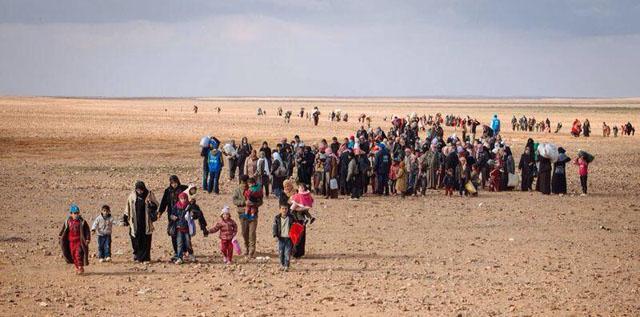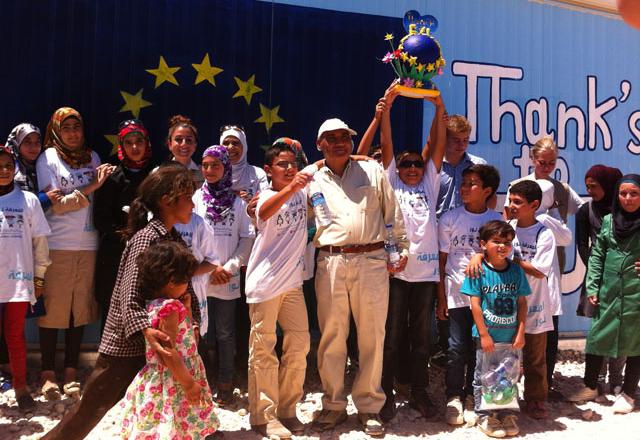AMMAN — UNICEF's work with Syrian refugees in the Kingdom will not affect the agency's country programme in Jordan, according to a senior UN official.
“We are here to serve every child, regardless of their status, thanks to the Convention on the Rights of [the Child (CRC)]," Michele Servadei, deputy representative and officer in charge of UNICEF Jordan, said in a recent interview with The Jordan Times.
"Every child is under our mandate in four to five sectors that include health and nutrition, water and sanitation, child protection and education,” Servadei added.
In the last two years, the UN agency's office in Jordan grew financially and in terms of human resources because of the Syrian crisis, “but we want to make sure that these resources benefit Jordanian children while we are here”, he noted.
“We are trying to link up what we have in our regular programmes for Jordanians with the emergency [ones] and we are also dedicating the emergency resources to serve more Jordanians. So, we have resources to do things that we could not [do] before,” he explained.
The UN official noted that the focus of his agency on local programmes this year will be the same as before the crisis began.
“Our focus before the emergency was a lot on child protection; we are very happy that the government is taking the CRC seriously," he said, adding that the Kingdom's implementation of the convention will be reviewed in June next year.
However, this year the agency is shifting from providing institutional care for children to foster care.
Servadei explained that there are some 2,000 children in Jordan with problematic parental care.
“What we advocate for is to shift services provided to these children from institutional care to foster care, as we have evidence that shows children in foster care are developing much faster than children in institutions,” he noted.
“It is better for a child to be in a family environment, and we want to help the government to shift towards foster care.”
The shift is expected to cost 50 per cent less than keeping children in institutions, Servadei said, adding that UNICEF has started a pilot programme with these children and will also help in building the capacity of public social workers to follow up with children in foster care.
Another priority for UNICEF in 2014 is to advocate for further action to combat violence against children.
“The issue is not only related to teacher-child violence, but also to child-to-child violence [and] to lower levels of domestic violence and sexual harassment,” the UNCEF official said, adding that violence in Jordan is “in many cases… quite hidden”.
Thus, UNICEF is advocating for a comprehensive reporting system for victims of violence to use.
Currently, victims of violence can use the hotline of the Family Protection Department or report to hospitals.
“What we would advocate for is to have one comprehensive system, not only to track violence but also one single hotline [number] that every Jordanian knows and [can address] any type of violence against children, ” Servadei said.
“We would like to attract more funding for this purpose and this could be through the emergency programme.”
The agency will also continue working with young people through the UNICEF Change Agents Network that was created last year.
Participants in this network receive training on community-based projects and leadership. The network offers them a platform to discuss different issues through social media and face-to-face.
In addition, UNICEF is supporting the Health Ministry in its programmes that seek to reduce neonatal and infant mortality
“Last year, we [prepared] a study and showed that 40 to 50 per cent of cases are preventable. Thus, we are working with the ministry on qualitative services,” Servadei said.
UNICEF also supported the nationwide immunisation campaigns that were launched last year.
“Because of the Syrian crisis, measles is back in the country, and cases of polio were discovered in Syria,” he noted, adding that the measles vaccination campaign reached 3.3 million people, while over one million children were immunised against polio.
The UNICEF official said the agency worked on building the capacities of the public health sector by buying vaccines and providing cold chains to help the authorities respond in future emergencies.
Education and refugees
In general, Jordan has made remarkable progress in education in terms of enrolment, according to the UNICEF representative, who noted that the Syrian crisis led to double-shift schools and some restrictions and burdens on the state budget.
“A lot of new resources are coming in — more money — so we should channel this money properly,” Servadei said, thanking the government of Jordan for opening its schools to Syrians as “very few governments in the region have been that generous”.
Although he acknowledged that UNICEF will not be able to help in building schools, he said the agency is assisting in constructing prefabricated classrooms.
“It is very difficult to build new schools because [of] budget constraints… what we are trying to build is the capacity of the government to respond in the future,” he explained, adding that UNICEF also provides training for teachers.
Some 30,000 Syrian refugee children eligible for formal education are not in school, while more than 50,000 are not eligible for formal education, according to Servadei.
“We have registered 107,000 Syrian children so far... A lot more needs to be done and we will use the child-friendly spaces for those children,” he noted.
However, there are some challenges facing the agency's work, the UNICEF representative said.
“We have to admit that there are Jordanian children that are out of school and those are probably the most vulnerable — children from minority groups, children with disabilities and working children.”
In order to provide all services in response to the needs of Syrian refugees, the agency requires $170 million in emergency funds for the current year.













